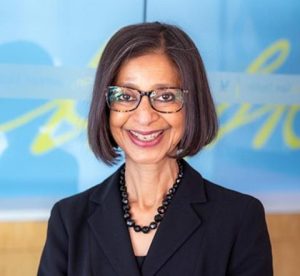Long before artificial intelligence (AI) was making headlines, Ritu Agarwal was dedicating her doctoral work to the “nascent field” back in the 1980s.

Along with a PhD, she holds an MBA and a master’s in computer science. She devoted the first half of her career to research in information systems in business settings, yet she was always intrigued by the promise of digital technologies for serving societies.
Today Agarwal is an expert in the application of information technology, analytics, and AI in health care. She joined the Johns Hopkins Carey Business School in the fall of 2022 as the first of three endowed faculty who will hold the title of Wm. Polk Carey Distinguished Professor. The professorships are named for Wm. Polk Carey, whose $50 million contribution to Johns Hopkins University in 2006 spurred the founding of the Carey Business School.
Agarwal is also the school’s founding co-director of the Center for Digital Health and Artificial Intelligence (CDHAI). Faculty associated with CDHAI includes multi-disciplinary scholars from the Carey Business School, Bloomberg School of Public Health, and Whiting School of Engineering, as well as several student fellows.
We caught up with Agarwal to learn more about her research in digital health, commitment to social impact, and roles at the Carey Business School.
In 2005, I experienced a sense of dissatisfaction with my research program. I wanted to have an impact with my scholarship because it was such a big part of my life. That’s when I pivoted to health care. It’s the business sector that affects each and every person on this planet and disturbingly, woefully lagging in its adoption and assimilation of digital technologies. Health care comprises close to 18% of GDP — that’s approximately one in every six dollars spent.
The professorship has enabled me to set up CDHAI. The center conducts cutting-edge research and focuses on the core goals of working closely with business partners; engaging with the local community, including the city of Baltimore; promoting entrepreneurship; interacting with policy makers; and educating executives and students alike — about what a new digitally reimagined health care system might look like and how we get there.
The quest for a healthy life and access to high-quality health care are fundamental pursuits for all of humanity. The world is going to face profound challenges in the future, from an aging population to projected shortages of health care professionals. Employers, policy organizations, and all businesses are deeply concerned about rising costs. Digital health technologies and AI offer potential solutions to these challenges.
The research that CDHAI conducts helps move the needle forward in understanding how, when, and where innovations can be deployed. Everyone will be affected as we learn how to consume health care through digital channels; to better manage our own health with mobile apps, wearables, and sensors; and to age in our homes safely and comfortably using remote monitoring technologies and AI systems.
One important and aspirational goal for me is to influence thinking about health equity. We want AI to mitigate health inequities, to identify and correct systemic biases that may be reflected in health care data, and to enable us to deliver solutions where health outcomes are no longer a function of race or ethnicity or which zip code you reside in.
My vision for the research is to create rigorous, scientific, and novel understanding of the role of digital technologies and AI in health care practice and delivery. I focus on translational work, to guide practitioners and those who are conceptualizing and bringing to market digital innovations in health care. Ultimately, it is the end-consumer who is the target: the patient who seeks a healthy life and access to health care.
Guiding and mentoring the next generation of citizens who will go on to become (or already are) contributing members of society, future leaders, and thoughtful scholars is arguably the most important responsibility (and privilege) of a professor. What I love about teaching is the ‘eureka’ moment that you see in the eyes of students — when suddenly, the jigsaw puzzle emerges as a coherent picture. I am immensely gratified when I run into students whom I taught 20 years ago who remind me of a concept I discussed in class and how it served them well in their professional lives!
I am an avid hiker and simply love being outdoors and communing with nature, in a national park or in any beautiful part of the world where I can see spectacular landscapes not accessible any other way except on foot — and where the internet connection is weak! I also very much enjoy theater and the opera. Finally, travel is high on the list to interesting places all over the world of historic significance but that also have amazing trails.
Interested in supporting AI research to improve health care delivery and equity?
Topics: Alumni, Faculty and Staff, Friends of Johns Hopkins Medicine, Carey Business School, Fuel Discovery, Promote and Protect Health